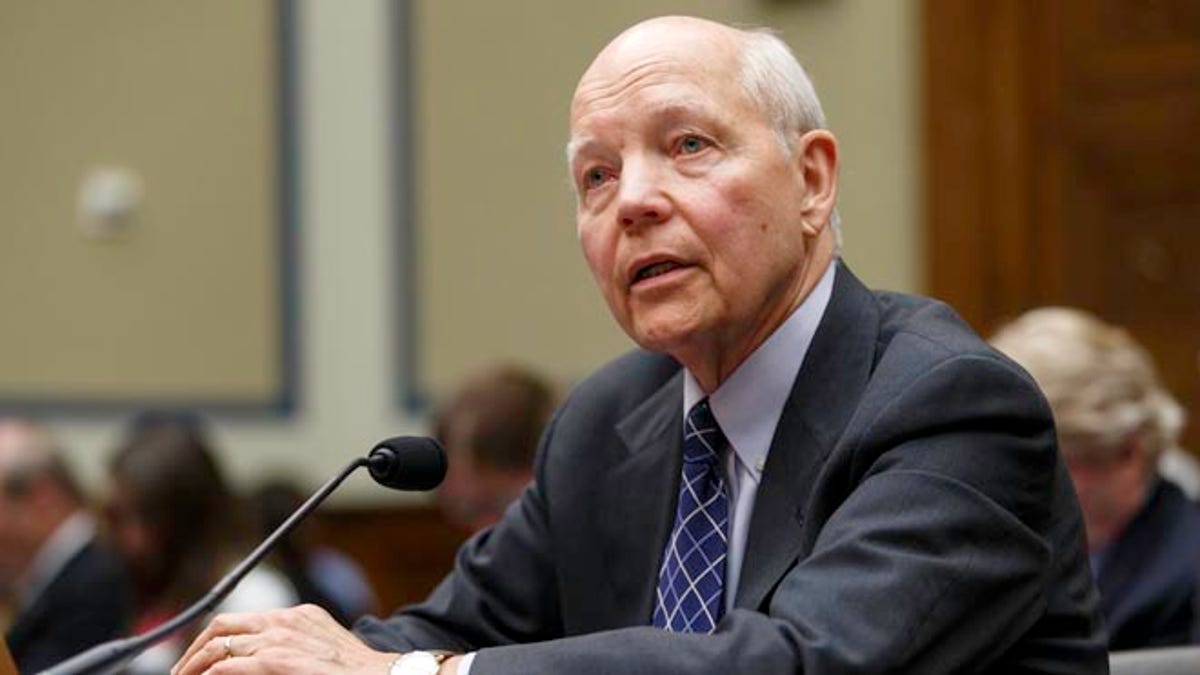
Internal Revenue Service Commissioner John Koskinen testifies under subpoena before the House Oversight Committee on Capitol Hill in Washington, Monday, June 23, 2014. (AP)
The U.S. government is making roughly $100 billion in improper payments every year thanks to a combination of fraud, clerical errors and insufficient IRS enforcement, according to testimony at a congressional hearing on Wednesday.
“The amounts here are absolutely staggering,” Rep. John Mica, R-Fla., said.
The problem of erroneous payments – largely from Medicare and other health care programs – is not a new one. But Mica said at the hearing of a House oversight subcommittee that federal agencies reported over $100 billion in improper payments during each of the last five years.
That’s roughly what the Obama administration spent on the Afghanistan war and other security operations last year.
“That’s an incredible amount of money that has been misappropriated, mis-paid,” Mica said.
The money is coming from an array of agencies, and includes tax credits to families that didn't qualify, unemployment benefits to people who had jobs and medical payments for treatments that might not have been necessary.
In 2013, federal agencies made $97 billion in overpayments, according to agency estimates. Underpayments totaled $9 billion.
Congressional investigators say the figures could be even higher.
The Obama administration has stepped up efforts to measure improper payments and develop plans to reduce them, said Beth Cobert, deputy director of the White House budget office. Agencies recovered more than $22 billion in overpayments last year. The amount of improper payments has steadily dropped since 2010, when it peaked at $121 billion.
“This is an important issue to the IRS,” IRS Commissioner John Koskinen said Wednesday, claiming the agency has made “important progress” catching – and preventing – billions of dollars’ worth of payments in connection with suspicious tax returns.
But he described it as an “ongoing battle” and said more needs to be done. To help, he urged Congress to make changes giving the IRS more flexibility to fact-check taxpayer claims and better regulate tax preparers.
Still, estimates from federal agencies show some are wasting big money at a time when Congress is squeezing agency budgets and looking to save more.
"Nobody knows exactly how much taxpayer money is wasted through improper payments, but the federal government's own astounding estimate is more than half a trillion dollars over the past five years," Mica said.
Each year, federal agencies are required to estimate the amount of improper payments they issue. They include overpayments, underpayments, payments to the wrong recipient and payments that were made without proper documentation.
Some improper payments are the result of fraud, while others are unintentional, caused by clerical errors or mistakes in awarding benefits without proper verification.
The largest sources of improper payments are government health care programs, according to agency estimates. Medicare's various health insurance programs for older Americans accounted for $50 billion in improper payments in the 2013 budget year, far exceeding any other program.
Most of the payments were deemed improper because they were issued without proper documentation, said Shantanu Agrawal, a deputy administrator for the Centers for Medicare & Medicaid Services. In some cases, the paperwork didn't verify that services were medically necessary.
Among other programs with large amounts of improper payments:
-- The earned income tax credit, which provides payments to the working poor in the form of tax refunds. Last year, improper payments totaled $14.5 billion. That's 24 percent of all payments under the program.
The EITC is one of the largest anti-poverty programs in the U.S., providing $60.3 billion in payments last year. Eligibility depends on income and family size, making it complicated to apply for the credit -- and difficult to enforce, Koskinen says.
-- Medicaid, the government health care program for the poor. Last year, improper payments totaled $14.4 billion.
Medicaid, which is run jointly by the federal government and the states, has seen a steady decline in improper payments since 2010, when they peaked at $23 billion. The program is expanding under President Barack Obama's health law.
-- Unemployment insurance, a joint federal-state program that provides temporary benefits to laid-off workers. Amount of improper payments last year: $6.2 billion, or 9 percent of all payments.
The Labor Department said most overpayments went to people who continued to get benefits after returning to work, or who didn't meet state requirements to look for work while they were unemployed. Others were ineligible for benefits because they voluntarily quit their jobs or were fired.
-- Supplemental Security Income, a disability program for the poor run by the Social Security Administration. Amount of improper payments: $4.3 billion, or 8 percent of all payments.
Social Security's much larger retirement and disability programs issued $2.4 billion in improper payments, according to agency estimates. Those programs provided more than $770 billion in benefits, so improper payments accounted for less than 1 percent.
The Associated Press contributed to this report.




